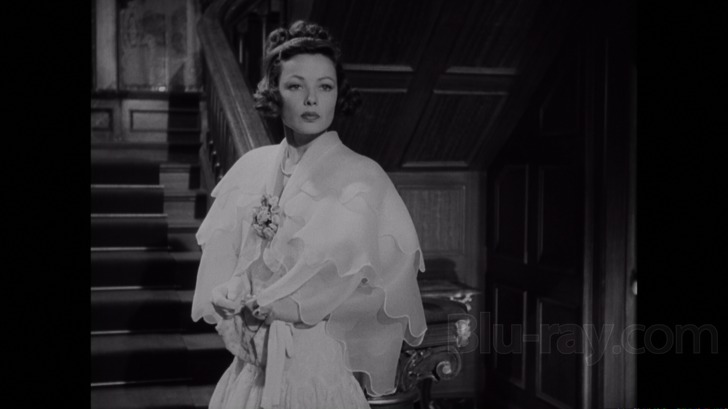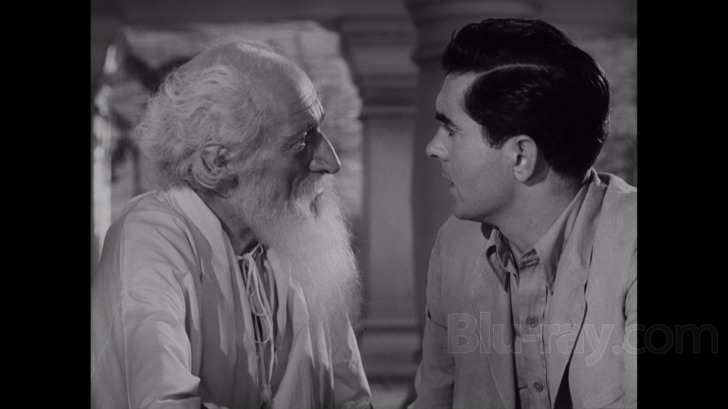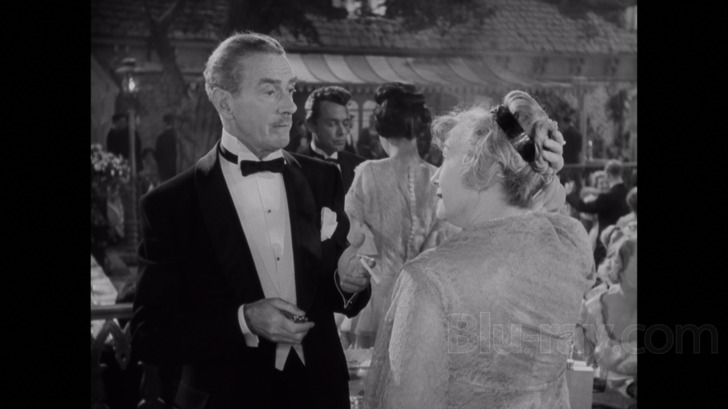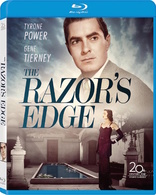The Razor's Edge Blu-ray Movie
HomeThe Razor's Edge Blu-ray Movie 
Fox Studio Classics20th Century Fox | 1946 | 145 min | Not rated | Jan 13, 2015
Movie rating
7.4 | / 10 |
Blu-ray rating
| Users | 4.0 | |
| Reviewer | 4.0 | |
| Overall | 4.0 |
Overview
The Razor's Edge (1946)
Tyrone Power and Gene Tierney bring renowned novelist W. Somerset Maugham's best-seller to life in this mesmerizing film classic which questions society's values. Narrated by onscreen observer Maugham (Herbert Marshall), this intriguing tale centers on a soul-searching World War I veteran (Power) who finds he cannot settle back into the world of the upper class. Shunning his planned marriage and career, he travels abroad to seek the meaning of life and causes his distraught fiancee (Tierney) to seek solace with another man (John Payne).
Starring: Tyrone Power, Gene Tierney, John Payne (I), Anne Baxter, Clifton WebbDirector: Edmund Goulding
| Romance | Uncertain |
| Period | Uncertain |
| Drama | Uncertain |
| Adventure | Uncertain |
Specifications
Video
Video codec: MPEG-4 AVC
Video resolution: 1080p
Aspect ratio: 1.34:1
Original aspect ratio: 1.37:1
Audio
English: DTS-HD Master Audio Mono (48kHz, 24-bit)
Spanish: Dolby Digital Mono
Subtitles
English SDH, Spanish
Discs
50GB Blu-ray Disc
Single disc (1 BD)
Playback
Region free
Review
Rating summary
| Movie | 4.0 | |
| Video | 4.0 | |
| Audio | 3.5 | |
| Extras | 2.0 | |
| Overall | 4.0 |
The Razor's Edge Blu-ray Movie Review
Money may not be possible, but you can you in fact take enlightenment with you.
Reviewed by Jeffrey Kauffman January 13, 2015Richard Linklater may be currently basking in the glow from his recent Golden Globes win(s) for Boyhood, but let’s not forget his really important contribution to popular culture, namely helping to spread consciousness of the phenonemnon known as the Slacker. Baby Boomers and Generation X-ers may want to believe that they invented this supposedly stress free lifestyle divorced from the hassles of everyday existence, but perhaps like death and taxes, there have evidently always been slackers, albeit folks not always known by that name. W. Somerset Maugham could hardly be typified as a slacker, and not just because of his patrician genetics and upbringing. Maugham had an incredibly full and varied life, having done everything from getting a medical degree, working as a medic during World War I, then a bit later as a spy (more or less), going on several spiritual expeditions to then rather exotic locales, not to mention writing a passel of best selling (and now quite iconic) novels and short stories, as well as several well received plays. Maugham’s characters are often on some kind of a quest, and that is certainly nowhere more apparent than with regard to the focal character of The Razor’s Edge, Larry Darrell (Tyrone Power). While Maugham himself is a minor character in both the novel and film adaptation (played by a somewhat uncomfortable seeming Herbert Marshall), elements of Maugham’s own life and yearning are none too subtly infused into Darrell’s search for a “higher meaning” in life. Ironically, that search begins with a proto-slacker response when his fiancée, tony socialite and debutante Isabel Bradley (Gene Tierney), wants Larry to settle down now that World War I has ended, a desire which includes accepting a job offered by one of her family’s acquaintances, so that the two can begin a comfortable (at least) upper middle class existence together. Larry will have none of it, however, telling Isabel that he wants to “loaf” instead. However, this isn’t the same kind of “slackerism” (to coin a word) that came to define at least some elements of a later generation. Larry’s abhorrence of the staid conventional life is not an out and out rejection per se, but stems more simply from a belief that there’s “something greater” out there to be found, if only one were to look in the right place.

The Razor’s Edge was first serialized in Redbook Magazine in the waning days of World War II, and it’s important to view both the source material and the resultant film through the prism of its epoch. While Maugham sets the story in the immediate aftermath of the previous World War, there’s little doubt that he’s drawing parallels between that time and what was currently going on. That similarity was probably only more pronounced by the time the film came out, after hostilities had ceased, for a whole coterie of returning servicemen were, much like Larry Darrell himself, attempting to come to grips with what they had experienced overseas and what meaning could be drawn from those experiences, not to mention what meaning could be invested into their lives as they at least tried to move forward.
There’s also an unintentional irony to the proceedings of The Razor’s Edge, at least when viewed through a bit of cultural hindsight. The returning vets and their families built an unapologetically materialistic, consumer driven society in the immediate aftermath of World War II that not only catapulted the United States to the top of the global heap, but which helped to lift any number of devastated European and Asian nations as well out of the morass created by World War II. Larry is decidedly anti-materialistic, something that Maugham uses to contrast with the object oriented (which includes money, of course) perspective of Isabel and her eventual husband (after she leaves Larry), Gray Maturin (John Payne). Isabel’s effete uncle Elliott Templeton (Clifton Webb) may not have any money worries himself, but he is similarly driven by ideas of social status and “keeping up appearances,” something that seems to be a certain family trait, as also evidenced by Isabel’s mother (Elliott’s sister), Louisa Bradley (Lucile Watson).
While Larry proves himself an able Everyman, forming easy camaraderie with ordinary working stiffs and then just as easily assimilating into an Eastern mystic’s Shangri-La like abode, Isabel finds out that (to purloin a phrase) “money ain’t all it’s cracked up to be.” Speaking of cracking up, the film features not one but two emotional breakdowns, one involving Gray, who develops psychosomatic symptoms after the Wall Street crash of 1929 (an affliction which Larry’s newfound mystical awareness is magically able to cure), and another one involving supporting character Sophie MacDonald (Anne Baxter, Oscar winner for this performance), a kind of Plain Jane whose life is tinged with tragedy and who turns to drink to salve her wounds. The Sophie character is a patently odd addition to a plot that otherwise emphasizes the dialectic between spiritual enlightenment and material success, but it provides Baxter with a couple of great scenes and further delineates Larry’s growth into someone trying to help others achieve salvation, rather than simply worrying about his own path to Nirvana.
The Razor’s Edge proves how provocative Hollywood could actually be during its so called Golden Age, sometimes either inadvertently or at least without perhaps fully appreciating how forward thinking their efforts were, at least at the time. Daryl F. Zanuck evidently well understood the book’s kind of counterculture thesis, but apparently was more bothered by some of the first treatments for a screenplay which (to Zanuck’s mind, anyway) were too screed like and overtly religious, not letting Larry’s story unfold organically. Larry’s quest turns out to be rather “Buddha like” in its own way, certainly a rather unexpected achievement for a film coming out of the stricture bound studio system, especially in the wake of World War II. Maybe Zanuck took a vacation to Shangri-La himself when no one was looking.
The Razor's Edge Blu-ray Movie, Video Quality 

The Razor's Edge is presented on Blu-ray courtesy of 20th Century Fox Home Entertainment with an AVC encoded 1080p transfer in 1.34.:1. While nothing rises to really objectionable levels, the elements utilized for this transfer do have fairly ubiquitous if admittedly pretty minor issues with damage like dust, dirt, scratches and minus density. When not standing with your nose pressed up against the screen, many of these issues are negligible and are never much of a distraction in any case. There are also very slight but noticeable density fluctuations at times, but again nothing that should seriously hobble one's enjoyment of the film. Contrast and black levels are both excellent, with clarity and sharpness also very pleasing. Grain is intact and resolves very naturally and with plenty of room on a BD-50 with only a few (SD) supplements to take up real estate, there are no compression issues of any note.
The Razor's Edge Blu-ray Movie, Audio Quality 

The Razor's Edge features a perfectly serviceable if somewhat dry and brittle sounding lossless DTS-HD Master Audio Mono track. While there's no damage per se, the age of the soundtrack is readily apparent, especially in the cues of Alfred Newman (and an apparently uncredited Edmund Goulding). Dialogue emerges unscathed, and while the track is shallow sounding, everything can be heard without any real problems.
The Razor's Edge Blu-ray Movie, Special Features and Extras 

- Commentary by Anthony Slide and Robert Birchard. While there's a bit of "dead air" throughout this commentary, Slide and Birchard offer a lot of sometimes picayune detail about the production, including some of Zanuck's battles to keep the film from seeming overly "preachy."
- Fox Movietone News (480i; 3:11) offers some quite interesting newsreel footage, including of W. Somerset Maugham himself.
The Razor's Edge Blu-ray Movie, Overall Score and Recommendation 

It would probably be a bit facile to say "they don't make 'em like this one anymore," except that they of course did try to make 'em like this, at least with regard to the underwhelming Bill Murray version, as well as any number of other films (especially some in the 1960s and 1970s) which tried to emulate Maugham's path of spiritual enlightenment whilst living (to quote a certain Madonna) in a material world. What's fascinating about The Razor's Edge is how prescient it is with regard to the lure of Eastern mysticism, as well as the then perhaps radical notion that amassing a pile of things might not be the ultimate meaning of life. Unusually literate and filled with great performances, The Razor's Edge is a very unique and distinctive film, and its debut on Blu-ray should be welcomed by pilgrims and high definition enthusiasts alike. Highly recommended.
Similar titles
Similar titles you might also like

The Last Time I Saw Paris
Warner Archive Collection
1954

The Hunchback of Notre Dame
1939

The Razor's Edge
1984

Some Came Running
Warner Archive Collection
1958

Madame Bovary
Warner Archive Collection
1949

A Star Is Born
Restored Edition | Warner Archive Collection
1937

Coco Chanel & Igor Stravinsky
2009

Madame Bovary
2014

Bel Ami
2012

The Gold Rush
1925 and 1942 Versions
1925

Dodsworth
Warner Archive Collection
1936

Stella Dallas
1937

Mr. Skeffington
1944

The Garden of Allah
1936

Sadie McKee
Warner Archive Collection
1934

A Place in the Sun
Paramount Presents #22
1951

Far from the Madding Crowd
Warner Archive Collection
1967

Cyrano de Bergerac
1950

The Light Between Oceans
2016

Green Dolphin Street
Warner Archive Collection
1947
